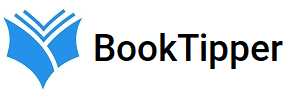Featured Non-Fiction & Biography

THE WOMAN IN ME
by Britney Spears
The Woman in Me is a brave and astonishingly moving story about freedom, fame, motherhood, survival, faith, and hope.
In June 2021, the whole world was listening as Britney Spears spoke in open court. The impact of sharing her voice—her truth—was undeniable, and it changed the course of her life and the lives of countless others. The Woman in Me reveals for the first time her incredible journey—and the strength at the core of one of the greatest performers in pop music history.
Written with remarkable candor and humor, Spears’s groundbreaking book illuminates the enduring power of music and love—and the importance of a woman telling her own story, on her own terms, at last.

ROMNEY: A RECKONING
by McKay Coppins
A remarkably illuminating biography of one of America’s most fascinating political figures—including news-making revelations from Mitt Romney himself about dissension within today’s Republican Party—written with his full cooperation by an award-winning writer at The Atlantic.
Few figures in American politics have seen more and said less than Mitt Romney. An outspoken dissident in Donald Trump’s GOP, he has made headlines in recent years for standing alone against the forces he believes are poisoning the party he once led. Romney was the first senator in history to vote to remove from office a president of his own party. When that president’s supporters went on to storm the US Capitol, Romney delivered a thundering speech from the Senate floor accusing his fellow Republicans of stoking insurrection. Despite these moments of public courage, Romney has shared very little about what he’s witnessed behind the scenes over his three decades in politics—in GOP cloakrooms and caucus lunches, in his private meetings with Donald Trump and his family, in his dealings with John McCain, George W. Bush, Barack Obama, Joe Biden, Mitch McConnell, Joe Manchin, and Kyrsten Sinema. Now, exclusively for this biography, Romney has provided a window to his most private thoughts.
Based on dozens of interviews with Romney, his family, and his inner circle as well as hundreds of pages of his personal journals and private emails, this in-depth portrait by award-winning journalist McKay Coppins shows a public servant authentically wrestling with the choices he has made over his career. In lively, revelatory detail, the book traces Romney’s early life and rise through the ranks of a fast-transforming Republican Party and exposes how a trail of seemingly small compromises by political leaders has led to a crisis in democracy. Ultimately, Romney: A Reckoning is a redemptive story about a flawed politician who summoned his moral courage just as fear and divisiveness were overtaking American life.


HIDDEN POTENTIAL
by Adam Grant
“This brilliant book will shatter your assumptions about what it takes to improve and succeed. I wish I could go back in time and gift it to my younger self. It would’ve helped me find a more joyful path to progress.”
—Serena Williams, 23-time Grand Slam singles tennis champion
The #1 New York Times bestselling author of Think Again illuminates how we can elevate ourselves and others to unexpected heights.
We live in a world that’s obsessed with talent. We celebrate gifted students in school, natural athletes in sports, and child prodigies in music. But admiring people who start out with innate advantages leads us to overlook the distance we ourselves can travel. We underestimate the range of skills that we can learn and how good we can become. We can all improve at improving. And when opportunity doesn’t knock, there are ways to build a door.
Hidden Potential offers a new framework for raising aspirations and exceeding expectations. Adam Grant weaves together groundbreaking evidence, surprising insights, and vivid storytelling that takes us from the classroom to the boardroom, the playground to the Olympics, and underground to outer space. He shows that progress depends less on how hard you work than how well you learn. Growth is not about the genius you possess—it’s about the character you develop. Grant explores how to build the character skills and motivational structures to realize our own potential, and how to design systems that create opportunities for those who have been underrated and overlooked.
Many writers have chronicled the habits of superstars who accomplish great things. This book reveals how anyone can rise to achieve greater things. The true measure of your potential is not the height of the peak you’ve reached, but how far you’ve climbed to get there.


HOW TO KNOW A PERSON
by David Brooks
A practical, heartfelt guide to the art of truly knowing another person in order to foster deeper connections at home, at work, and throughout our lives—from the #1 New York Times bestselling author of The Road to Character and The Second Mountain
As David Brooks observes, “There is one skill that lies at the heart of any healthy person, family, school, community organization, or society: the ability to see someone else deeply and make them feel seen—to accurately know another person, to let them feel valued, heard, and understood.”
And yet we humans don’t do this well. All around us are people who feel invisible, unseen, misunderstood. In How to Know a Person, Brooks sets out to help us do better, posing questions that are essential for all of us: If you want to know a person, what kind of attention should you cast on them? What kind of conversations should you have? What parts of a person’s story should you pay attention to?
Driven by his trademark sense of curiosity and his determination to grow as a person, Brooks draws from the fields of psychology and neuroscience and from the worlds of theater, philosophy, history, and education to present a welcoming, hopeful, integrated approach to human connection. How to Know a Person helps readers become more understanding and considerate toward others, and to find the joy that comes from being seen. Along the way it offers a possible remedy for a society that is riven by fragmentation, hostility, and misperception.
The act of seeing another person, Brooks argues, is profoundly creative: How can we look somebody in the eye and see something large in them, and in turn, see something larger in ourselves? How to Know a Person is for anyone searching for connection, and yearning to be understood.
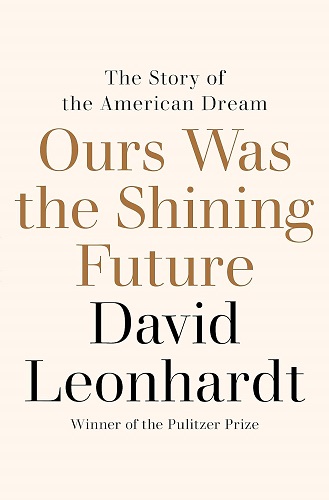

OURS WAS A SHINING FUTURE
by David Leonhardt
The clear-eyed, definitive history of the modern American economy and the decline of the American Dream, from the Pulitzer Prize–winning columnist behind The New York Times’s “The Morning” newsletter.
“With the even-handed incisiveness that has made him one of the country’s most-respected voices on economics, David Leonhardt illuminates the inside history of the players and missteps that have stolen so many Americans’ futures.”—Jane Mayer, author of Dark Money
Two decades into the twenty-first century, the stagnation of living standards has become the defining trend of American life. Life expectancy has declined, economic inequality has soared, and, after some progress, the Black-white wage gap is once again as large as it was in the 1950s. How did this happen in the world’s most powerful country? And what happened to the “American dream”—the promise of a happier, healthier, more prosperous future—which was once such an inextricable part of our national identity?
Drawing on decades of writing about the economy for The New York Times, Pulitzer Prize–winning writer David Leonhardt examines the past century of American history, from the Great Depression to today’s Great Stagnation, in search of an answer.
To make sense of the rise and subsequent fall of the American dream, Leonhardt tells the story of the modern American economy as an ongoing battle between two competing forms of capitalism: one that envisions prosperity for most, and one that serves the individual and favors the wealthy. In vivid prose, Ours Was the Shining Future traces how democratic capitalism flourished to make the American dream possible, until the latter decades of the twentieth century when, bit by bit, the dream was corrupted to serve only the privileged few.
Ours Was the Shining Future is a sweeping narrative full of innovation and grit, human drama and hope. Featuring the trailblazing figures who helped shape the American dream—Frances Perkins, Paul Hoffman, Cesar Chavez, Robert Kennedy, A. Philip Randolph, Grace Hopper, and more—this engaging history reveals the power of grassroots democratic movements from across the political spectrum. And though the American dream feels lost to us now, Leonhardt shows how Americans—if they commit themselves to transforming the economy, as they did in the past—have the power to revive the dream once more.
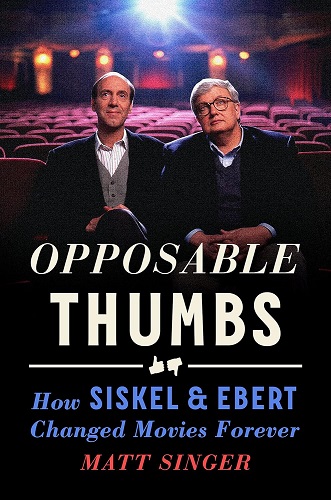

OPPOSABLE THUMBS
by Matt Singer
Once upon a time, if you wanted to know if a movie was worth seeing, you didn’t check out Rotten Tomatoes or IMDB.
You asked whether Siskel & Ebert had given it “two thumbs up.”
On a cold Saturday afternoon in 1975, two men (who had known each other for eight years before they’d ever exchanged a word) met for lunch in a Chicago pub. Gene Siskel was the film critic for the Chicago Tribune. Roger Ebert had recently won the Pulitzer Prize—the first ever awarded to a film critic—for his work at the Chicago Sun-Times. To say they despised each other was an understatement.
When they reluctantly agreed to collaborate on a new movie review show with PBS, there was at least as much sparring off-camera as on. No decision—from which films to cover to who would read the lead review to how to pronounce foreign titles—was made without conflict, but their often-antagonistic partnership (which later transformed into genuine friendship) made for great television. In the years that followed, their signature “Two thumbs up!” would become the most trusted critical brand in Hollywood.
In Opposable Thumbs, award-winning editor and film critic Matt Singer eavesdrops on their iconic balcony set, detailing their rise from making a few hundred dollars a week on local Chicago PBS to securing multimillion-dollar contracts for a syndicated series (a move that convinced a young local host named Oprah Winfrey to do the same). Their partnership was cut short when Gene Siskel passed away in February of 1999 after a battle with brain cancer that he’d kept secret from everyone outside his immediate family—including Roger Ebert, who never got to say goodbye to his longtime partner.But their influence on in the way we talk about (and think about) movies continues to this day.
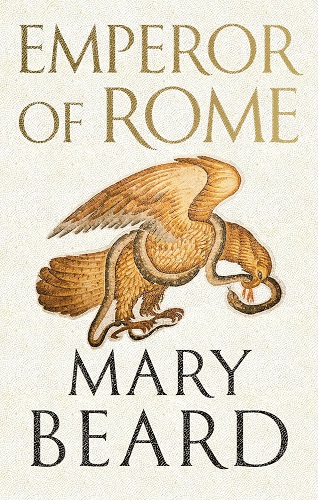

EMPEROR OF ROME
by Mary Beard
A sweeping account of the social and political world of the Roman emperors by “the world’s most famous classicist” (Guardian).
In her international bestseller SPQR, Mary Beard told the thousand-year story of ancient Rome, from its slightly shabby Iron Age origins to its reign as the undisputed hegemon of the Mediterranean. Now, drawing on more than thirty years of teaching and writing about Roman history, Beard turns to the emperors who ruled the Roman Empire, beginning with Julius Caesar (assassinated 44 BCE) and taking us through the nearly three centuries―and some thirty emperors―that separate him from the boy-king Alexander Severus (assassinated 235 CE).
Yet Emperor of Rome is not your typical chronological account of Roman rulers, one emperor after another: the mad Caligula, the monster Nero, the philosopher Marcus Aurelius. Instead, Beard asks different, often larger and more probing questions: What power did emperors actually have? Was the Roman palace really so bloodstained? What kind of jokes did Augustus tell? And for that matter, what really happened, for example, between the emperor Hadrian and his beloved Antinous? Effortlessly combining the epic with the quotidian, Beard tracks the emperor down at home, at the races, on his travels, even on his way to heaven.
Along the way, Beard explores Roman fictions of imperial power, overturning many of the assumptions that we hold as gospel, not the least of them the perception that emperors one and all were orchestrators of extreme brutality and cruelty. Here Beard introduces us to the emperor’s wives and lovers, rivals and slaves, court jesters and soldiers, and the ordinary people who pressed begging letters into his hand―whose chamber pot disputes were adjudicated by Augustus, and whose budgets were approved by Vespasian, himself the son of a tax collector.
With its finely nuanced portrayal of sex, class, and politics, Emperor of Rome goes directly to the heart of Roman fantasies (and our own) about what it was to be Roman at its richest, most luxurious, most extreme, most powerful, and most deadly, offering an account of Roman history as it has never been presented before.
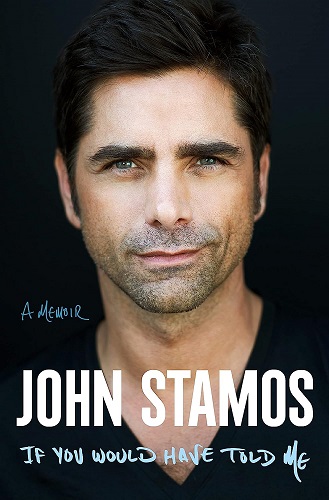

IF YOU WOULD HAVE TOLD ME
by John Stamos
“…I love him, and I respect him, and I need him. We all do.”
―from the foreword by Jamie Lee Curtis
If you would have told a young John Stamos flipping burgers at his dad’s fast-food joint that one day he’d be a household name and that, at the height of his success, he’d be living alone, divorced, with no kids, high on a cocktail of forgetting, he might’ve asked, “You want fries with that?”
John burst onto the scene in General Hospital, propelling him into the teen idol stratosphere, a place that’s often a point of no return. But Stamos beat the odds and over the past four decades has proved himself to be one of his generation’s most successful and beloved actors. Whether showing off his comedic chops on Full House or his dramatic skills on ER, pushing the boundaries on Broadway or living out his youthful dreams as an honorary Beach Boy, John has surprised everyone, most of all himself.
A universal story about friendship, love, loss, and the courage to embrace love once more, John Stamos’s memoir is filled with some of the most memorable names in Hollywood, both old and new. Funny, deeply poignant, and brutally honest, If You Would Have Told Me is a portrait of a boy who went from believing in Disney magic to a man who learns that we have to create our own magical moments in life.


THE FOOTBALL 100
by Mike Sando & Dan Pompei
From The Athletic, powerhouse of sports reporting, comes the definitive story of the greatest football players of all time.
It is a question that has bedeviled football fans for generations: Who’s the best? Of the more than 25,000 men who have suited up during the NFL’s century of existence, which ones stood head and shoulders above all others?
At The Athletic, home to the best newsroom in sports, this question would become a labor of love for dozens of the best football writers on the planet, including Mike Sando and Dan Pompei. Over the course of 100 riveting profiles—each drawing upon unparalleled access and superlative storytelling to offer intimate perspective on what made the greatest players tick—these writers reveal their findings. In the process, they also uncover the history of football.
In the early days of the NFL, the game bore little resemblance to the product we see today. Points were scarce, the forward pass was an exotic strategic curiosity, and most players played all 60 minutes—both sides of the ball. It was on the shoulders of the many greats who starred in the League over the last century that the game of football blossomed. Each profile in The Football 100 uses the vivid narrative storytelling for which The Athletic is known to bring to life extraordinary athletic talents, tactical geniuses who changed the way the game is played, and legendary, outsized personalities. Based on many hundreds of interviews with players, coaches, broadcasters, and others, this is a penetrating look at the greatest players to ever don cleats and pads, as well as a view from the trenches of the harsh realities of a brutal game. 100 photographs throughout the text offer testament to both the glory and the physical toll of football.
Deeply reported, beautifully written, and sure to spark heated debate among football fans of all stripes, The Football 100 sets a new standard for writing about the game.


SONIC LIFE
by Thurston Moore
From the founding member of Sonic Youth, a passionate memoir tracing the author’s life and art—from his teen years as a music obsessive in small-town Connecticut, to the formation of his legendary rock group, to thirty years of creation, experimentation, and wonder
“Downtown scientists rejoice! For Thurston Moore has unearthed the missing links, the sacred texts, the forgotten stories, and the secret maps of the lost golden age. This is history—scuffed, slightly bent, plenty noisy, and indispensable.” —Colson Whitehead, Pulitzer Prize–winning author of The Underground Railroad and Harlem Shuffle
Thurston Moore moved to Manhattan’s East Village in 1978 with a yearning for music. He wanted to be immersed in downtown New York’s sights and sounds—the feral energy of its nightclubs, the angular roar of its bands, the magnetic personalities within its orbit. But more than anything, he wanted to make music—to create indelible sounds that would move, provoke, and inspire.
His dream came to life in 1981 with the formation of Sonic Youth, a band Moore cofounded with Kim Gordon and Lee Ranaldo. Sonic Youth became a fixture in New York’s burgeoning No Wave scene—an avant-garde collision of art and sound, poetry and punk. The band would evolve from critical darlings to commercial heavyweights, headlining festivals around the globe while helping introduce listeners to such artists as Nirvana, Hole, and Pavement, and playing alongside such icons as Neil Young and Iggy Pop. Through it all, Moore maintained an unwavering love of music: the new, the unheralded, the challenging, the irresistible.
In the spirit of Just Kids, Sonic Life offers a window into the trajectory of a celebrated artist and a tribute to an era of explosive creativity. It presents a firsthand account of New York in a defining cultural moment, a history of alternative rock as it was birthed and came to dominate airwaves, and a love letter to music, whatever the form. This is a story for anyone who has ever felt touched by sound—who knows the way the right song at the right moment can change the course of a life.
Still Hot in Non-Fiction & Biography


GOING INFINITE
by Michael Lewis
AN INSTANT #1 NEW YORK TIMES BESTSELLER
“A stupefyingly pleasurable book to read.” ―The New Yorker
“Extraordinary.” ―The Observer
“Lewis’s storytelling is as good as ever.” ―The Economist
From the best-selling author of The Big Short and Flash Boys, the story of FTX’s spectacular collapse and the enigmatic founder at its center.
When Michael Lewis first met him, Sam Bankman-Fried was the world’s youngest billionaire and crypto’s Gatsby. CEOs, celebrities, and leaders of small countries all vied for his time and cash after he catapulted, practically overnight, onto the Forbes billionaire list. Who was this rumpled guy in cargo shorts and limp white socks, whose eyes twitched across Zoom meetings as he played video games on the side?
In Going Infinite Lewis sets out to answer this question, taking readers into the mind of Bankman-Fried, whose rise and fall offers an education in high-frequency trading, cryptocurrencies, philanthropy, bankruptcy, and the justice system. Both psychological portrait and financial roller-coaster ride, Going Infinite is Michael Lewis at the top of his game, tracing the mind-bending trajectory of a character who never liked the rules and was allowed to live by his own―until it all came undone.
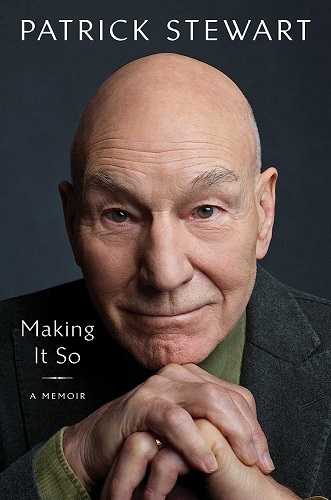

MAKING IT SO
by Patrick Stewart
THE NEW YORK TIMES AND USA TODAY BESTSELLER
The long-awaited memoir from iconic, beloved actor and living legend Sir Patrick Stewart!
From his acclaimed stage triumphs to his legendary onscreen work in the Star Trek and X-Men franchises, Sir Patrick Stewart has captivated audiences around the world and across multiple generations with his indelible command of stage and screen. Now, he presents his long-awaited memoir, Making It So, a revealing portrait of an artist whose astonishing life—from his humble beginnings in Yorkshire, England, to the heights of Hollywood and worldwide acclaim—proves a story as exuberant, definitive, and enduring as the author himself.
As an Amazon Associate, we may earn money from qualifying purchases.
